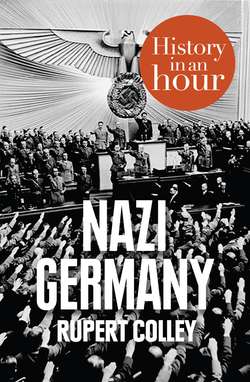Читать книгу Nazi Germany: History in an Hour - Rupert Colley - Страница 7
ОглавлениеThe Treaty of Versailles: ‘An armistice for twenty years’
On 28 June 1919, Germany reluctantly signed the Paris Peace Settlement in the Hall of Mirrors at the Palace of Versailles – exactly five years on from the assassination of Archduke Franz Ferdinand, the spark that had ignited the First World War. Germany had not been permitted to take part in the talks and was too weak, politically and militarily, to resist the dictated terms set by the representatives of thirty-two nations, led by the Allied powers – the US, Britain, France and Italy.
The terms were harsh and not for negotiation. Germany lost 13 per cent of her territory, which meant 12 per cent of Germans now lived in a foreign country, and Germany’s colonial possessions were redistributed among the other colonial powers. The German Rhineland, on the border with France, was to be demilitarized (stripped of an armed presence) and placed under Allied control until 1935. The small but industrially important Saar region was to be governed by Britain and France for fifteen years, and its coal exported to France in recompense for the French coal mines destroyed by Germany during the war. After fifteen years a plebiscite (or referendum) of the Saar population would decide its future.
Most of West Prussia was given to Poland. The German city of Danzig (modern-day Gdansk) was made a ‘free’ city so that Poland could have use of a port not situated in Germany. To give Poland access to Danzig, they were given a strip of land, the ‘Polish Corridor’, through Prussia, thereby cutting East Prussia off from the rest of Germany.
Militarily, Germany’s army was to be limited to a token 100,000 men, and its navy to 15,000, plus a ban on conscription. She was not permitted to have an air force, nor tanks, and was prohibited from producing or importing weaponry.
The payment of reparations was for ‘compensation for all damage done to the civilian population of the Allied powers and their property’. It was to include raw material, such as the coal from the Saar and Ruhr regions. Two years later, in 1921, the cost of reparations was announced – £6.6 billion, which German economists calculated would take until 1988 to pay. The figure shocked and angered Germans who conveniently forgot that Germany had demanded an even greater sum from a defeated France following the Franco-Prussian War of 1870–71.
But it was the humiliating clause that forced Germany into accepting responsibility for the war and for the damage to the civilian populations of the Allies that rankled most with the public at home.
The treaty satisfied no one. Germany was outraged. Britain thought it too harsh, believing an economically weak Germany would be detrimental to all Europe; the US, also considering it harsh, refused to ratify the treaty or to join the newly formed League of Nations; and the French felt it not harsh enough. It was they, the French argued, who had suffered most during the war. The French public were so dissatisfied with their president, Clemenceau, that they voted him out six months later, replacing him with Ferdinand Foch who, with sharp intuition, said, ‘This is not peace, this is an armistice for twenty years.’
The Weimar government, although democratically elected, was deemed responsible for Germany’s humiliation, and criticized by all sides for its weakness in standing up to the Allies. In March 1920 the Freikorps, led by Wolfgang Kapp, tried to seize power in Berlin but the coup, unable to gain the army’s support, failed.
